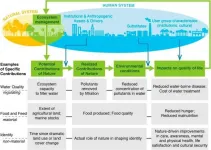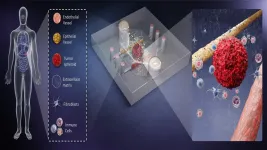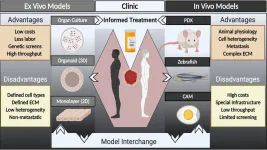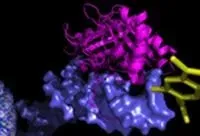The downward trend: Nature's decline risks our quality of life
Scientists conducted a sweeping review of nature's contributions to humans in order to present a clear breakdown of global trends since 1970. Not surprisingly, the results are grim
2021-01-21
(Press-News.org) It is no secret that over the last few decades, humans have changed nature at an ever-increasing rate. A growing collection of research covers the many ways this is impacting our quality of life, from air quality to nutrition and income. To better understand how which areas are most at risk, scientists have combed through volumes of literature to present global trends in the relationship between human wellbeing and environmental degradation.
Their work, which included Fabrice DeClerck from the Alliance of Bioversity International and CIAT, was summarized in "Global trends in nature's contributions to people", which was recently published in Proceedings of the National Academy of Sciences.
This systematic review builds on the Intergovernmental Science-Policy Platform on Biodiversity and Ecosystem Services (IPBES) Global Assessment Report, which in 2019 provided the most comprehensive assessment yet of nature's decline and biodiversity loss, when it emphasized that 1 million plant and animal species face extinction.
The PNAS review evaluates how biodiversity loss affects human wellbeing. It differentiates between nature's potential contributions, realized contributions, environmental conditions, and impact on quality of life. Material and non-material indicators, including greenhouse gas concentration, pest control and cultural knowledge were used to assess whether trends were worsening, about the same, or improving since 1970. Unsurprisingly, many were shown to be in sharp decline. Particularly in the context of agriculture, the review underscores that we face interrelated risks such as declining crop yields, declining pollinator populations, and reduced soil productivity.
Even increases in areas such as volume of crop commodity production hold a warning, as trends on human health from food diverge depending on variables such as region and socioeconomic context.
This paper represents one step in documenting the importance of nature's contributions to people, which the scientists hope can improve our ability to manage earth systems effectively, equitably, and sustainably.
"Nature contributes to our health and well-being in many ways, and our actions put these benefits at risk," said author Kate Brauman of the University of Minnesota.
INFORMATION:
[Attachments] See images for this press release:

ELSE PRESS RELEASES FROM THIS DATE:
2021-01-21
WASHINGTON, January 21, 2021 -- Despite cancer being a leading cause of death worldwide, treatment options for many types of cancers remain limited. This is partly due to the in vitro tools used to model cancers, which cannot adequately predict the behavior of a cancer or its sensitivity to drugs.
Further, animal models, like mice, biologically differ from humans in ways that play a critical role in immunotherapy, and results from animal studies do not always translate well to human disease.
These shortcomings point to a clear need for a better, patient-specific model to improve the understanding of cancer cells and their impacts.
Researchers from the University of Wisconsin and the University ...
2021-01-21
Medicated drops may help close small macular holes over a two- to eight-week period, allowing some people to avoid surgery to fix the vision problem, a new study suggests.
The findings, based on a retrospective multicenter case series published Dec. 15, 2020, in Ophthalmology Retina, could lead to a better understanding of which patients may benefit from the treatment, as well as the timeline of the treatment's effectiveness.
"For certain patients, medicated drops may heal their macular hole by decreasing inflammation and increasing fluid absorption in the retina," said ophthalmologist and retinal surgeon Dimitra Skondra, MD, PhD, senior author of the study. Skondra is an associate professor of ophthalmology and visual ...
2021-01-21
WASHINGTON, January 21, 2021 -- Cancer is a major, worldwide challenge, and its impact is projected to escalate due to aging and growth of the population. Researchers recognize that new approaches to diagnose and treat deadly cancers, including identifying new drugs to treat cancer, will be essential to curbing the growing impact of the disease.
While decades of investment in research have resulted in substantial improvements in surviving cancer, a key challenge remains in identifying new drugs that improve outcomes for cancer patients, particularly for cancers when tumors have spread throughout the body.
In APL Bioengineering, by AIP Publishing, researchers suggest a major hurdle to identifying new drugs is the paucity of models -- organisms ...
2021-01-21
EUGENE, Ore. -- Jan. 21, 2021 -- Developing economies suffer from a paradox: they don't receive investment flows from developed economies because they lack stability and high-quality financial and lawmaking institutions, but they can't develop those institutions without foreign funds.
A study co-authored by Brandon Julio, a professor in the Department of Finance at the University of Oregon's Lundquist College of Business, found that bilateral investment treaties, commonly known as BITs, can help developing economies overcome this paradox, but only as long as those ...
2021-01-21
Researchers at Vanderbilt University Medical Center and colleagues have identified genetic factors that increase the risk for developing pneumonia and its severe, life-threatening consequences.
Their findings, published recently in the American Journal of Human Genetics, may aid efforts to identify patients with COVID-19 at greatest risk for pneumonia, and enable earlier interventions to prevent severe illness and death.
Despite the increasing availability of COVID-19 vaccines, it will take months to inoculate enough people to bring the pandemic under control, experts predict. In the meantime, thousands of Americans are hospitalized and die from COVID-19 each ...
2021-01-21
A new study from researchers at MIT uncovers the kinds of infrastructure improvements that would make the biggest difference in increasing the number of electric cars on the road, a key step toward reducing greenhouse gas emissions from transportation.
The researchers found that installing charging stations on residential streets, rather than just in central locations such as shopping malls, could have an outsized benefit. They also found that adding on high-speed charging stations along highways and making supplementary vehicles more easily available to people who need to travel beyond the single-charge range of their electric vehicles could greatly increase the vehicle electrification potential.
The findings are reported today in the journal Nature Energy, in a paper by MIT associate ...
2021-01-21
DAVIS, Calif., January 21, 2020 - A new peer-reviewed study reveals that the vast majority of U.S. infants may be suffering from a substantial deficiency in an important bacterium key to breast milk utilization and immune system development, as well as protection against gut pathogens linked to common newborn conditions such as colic and diaper rash.
According to the study published today in END ...
2021-01-21
Sex-specific chromosomes are a dangerous place to be, if you're a gene. Because these chromosomes -- Y chromosomes, in humans -- do not have a matching chromosome with which to exchange genetic information, they are prone to losing non-essential genes left and right in a process called genetic decay.
Now, a new study from research scientist Daniel Winston Bellott in the lab of Whitehead Institute Member David Page broadens our understanding of what makes a gene able to survive on a sex-specific chromosome by looking at one especially slithery branch of the evolutionary tree: snakes.
Comparing surviving genes on snake ...
2021-01-21
PHILADELPHIA -- (Jan. 21, 2021) -- Researchers at The Wistar Institute have discovered a new enzymatic function of the Epstein-Barr Virus (EBV) protein EBNA1, a critical factor in EBV's ability to transform human cells and cause cancer. Published in Cell, this study provides new indications for inhibiting EBNA1 function, opening up fresh avenues for development of therapies to treat EBV-associated cancers.
EBV establishes life-long, latent infection in B lymphocytes, which can contribute to development of different cancer types, including Burkitt's lymphoma, nasopharyngeal carcinoma (NPC) and Hodgkin's lymphoma.
The Epstein-Barr Nuclear Antigen 1 (EBNA1) serves as an attractive therapeutic ...
2021-01-21
Two out of five individuals delayed or missed medical care in the early phase of the pandemic--from March through mid-July 2020--according to a new survey from researchers at the Johns Hopkins Bloomberg School of Public Health.
The survey of 1,337 U.S. adults found that 544, or 41 percent, delayed or missed medical care during the survey period. Among the 1,055 individuals who reported needing medical care, 29 percent (307 respondents), indicated fear of transmission of COVID-19 as the main reason. Seven percent (75 respondents) reported financial concerns as the main reason for delaying ...
LAST 30 PRESS RELEASES:
[Press-News.org] The downward trend: Nature's decline risks our quality of life
Scientists conducted a sweeping review of nature's contributions to humans in order to present a clear breakdown of global trends since 1970. Not surprisingly, the results are grim






